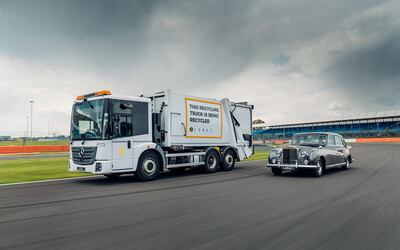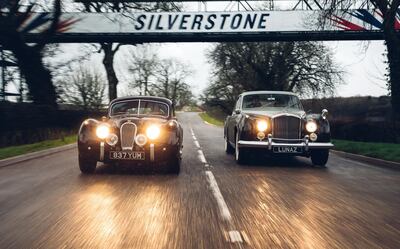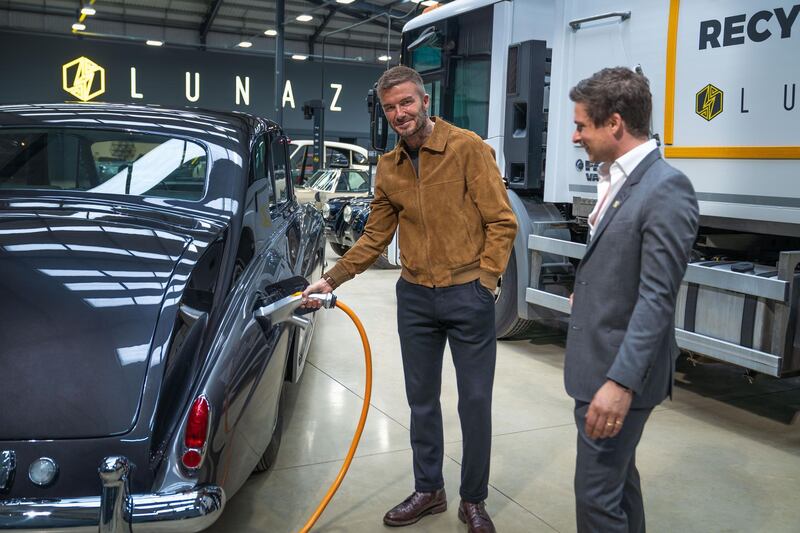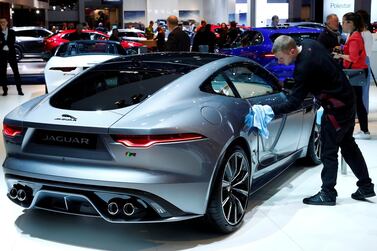Former professional footballer David Beckham invested an undisclosed amount in the British electric vehicle company, Lunaz, acquiring a 10 per cent stake in the firm.
The former LA Galaxy and AC Milan player, renowned for his bending free-kicks, joined British businessman Alexander Dellal and the UK-based Reuben and Dellal families in the latest funding round of Lunaz, according to a company statement. Lunaz did not disclose the value of the funding.
"Lunaz represents the very best of British ingenuity in both technology and design," said Mr Beckham, who has backed start-ups in various sectors such as e-sports and athletic recovery products through his investment company DB Ventures.
"I was drawn to the company through their work restoring some of the most beautiful classic cars through upcycling and electrification … [they] are building something very special and I look forward to being part of their growth," he added.
Founded in 2018, Silverstone-headquartered Lunaz electrifies luxury cars like Rolls-Royce, Bentley, Jaguar and Range Rover.
The company upcycles and converts vehicles to clean-air powertrains. It replaces polluting engines and fits batteries and electric motors with zero exhaust emissions.
The upcycling of existing passenger, industrial and commercial vehicles presents a "sustainable alternative" to replacing with new vehicles, David Lorenz, founder and chief executive of Lunaz, said.
"Our approach will save fleet operators capital while dramatically reducing waste in the global drive towards de-carbonisation … this top tier investor commitment is testament to Lunaz’ path to defining the market for remanufacturing and conversion to clean-air powertrains," he added.

Restrictive emissions and fuel-efficiency regulations have forced car brands around the world to produce vehicles that are environmentally friendly.
In November, the UK government decided to stop selling fossil-fuel cars from 2030.
In January, General Motors, the largest US car maker, said it plans to eliminate petrol and diesel light-duty cars, including SUVs, by 2035. Volkswagen, the second-largest car maker by sales last year, plans to unveil about 70 new electric models by 2028.
By 2030, when internal combustion engine bans in major markets come into effect, more than 2 billion traditionally-powered vehicles will exist on the roads, according to the industry experts. Remanufacturing, upcycling and electrification can prevent a large proportion of these vehicles from being scrapped. This approach is in line with the principles of the emerging circular economy.
"Firms like ours, which operate in the principles of the circular economy show that British industry can provide potent answers to the global need to transition to less impactful industrial practices," said Mr Lorenz.
"Our commitment to Silverstone affirms the UK’s status as a leader in the development of clean-air automotive technologies," he added.

Following the injection of the new funds, Lunaz now aims to expand its offering to the electrification of industrial vehicles.
It will begin with industrial heavy goods vehicles including refuse trucks, of which 80 million exist in the UK, the US and Europe alone. Lunaz said it plans to double the number of jobs for engineers and manufacturing technicians at its Silverstone facility by the end of this year.
The company’s remanufacturing and electrification process will save fleet operators significant costs. A municipal authority could save more than 43 per cent in the total cost of ownership of an upcycled and electrified refuse truck versus replacing their existing fleet with new equivalent electric vehicles, according to the company.








